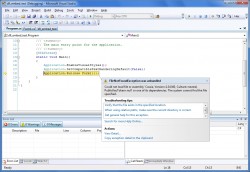The Last Word
Again, I stress, make backups! They can really save your bacon should you run into trouble later on. Some burning software, such as Nero, will allow you to create a full hard drive backup on to CDs or DVDs. WinRar, used in conjunction with task scheduler and batch files, can perform scheduled backups of data, as shown in this past PCMech Newsletter. For a complete backups of a hard drive, Norton Ghost ($69.95US), which will make an ISO of your drive through DOS, Acronis True Image ($49.99US), which can create incremental backups while in Windows, and BackUp MyPC ($69.99US – $79.99US), another fine package that can backup data while in Windows, all do the job well. When it comes to backing up data nowadays, CDs are often not large enough for data. Sometimes single files are larger than what can fit on a CD. Burnable DVDs or external USB/FireWire hard drives can be good alternatives for larger backups.
If there only three things you walk away with as the result of reading this article, they are these:
- As much as it sounds like a broken record, make backups. If you have a backup, you will not have to waste time pulling your hair out attempting to recover important data.
- Defrag your drive(s) with relative frequency. Restoring files found in one continuous place rather than pieces being scattered all over the place makes recovery more probable.
- Don’t write to your drive(s). By writing to your drive, you may inadvertently overwrite sectors containing parts of the files you are trying to recover.
These three things will most likely cover almost any situation that may arise. Even if your drive hasn’t bitten the dust yet, it is a sure bet that it will eventually. Don’t wait for a hard drive failure to give you a “wake up” call. Prevention is half of the method of data recovery. As many tech people have said before, with hard drives, it’s not a matter of if they go, but when they go. I will not be responsible for anything you may do to your drive to cause data loss or a failure, but hopefully, this lengthy article has proven useful to you by offering guidelines in data recovery, as well as in data loss prevention. Good luck!




 AdamTheTech.com and respective content is Copyright 2003-2024.
AdamTheTech.com and respective content is Copyright 2003-2024.